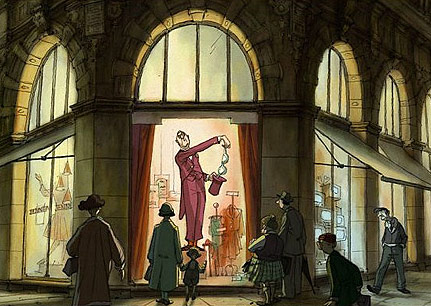
| HOME |
| NERVE |
| REVIEWS |
| ARCHIVE |
| EVENTS |
| LINKS |
| ABOUT US |
| CONTRIBUTORS |
| BACK ISSUES |
| CONTACT US |
 The Illusionist
(PG)
The Illusionist
(PG)
Directed by Sylvain Chomet
Written by Jacques Tati (original screenplay, Sylvain Chomet)
Screening at FACT from 20th August
2010
Reviewed by Charles McIntyre
A re-imagining of an unfilmed Jacques Tati script, The Illusionist explores the tragic melancholy of the lonely performer with heart breaking deftness. The film is directed, adapted and scored by Sylvain Chomet, whose prior success with Belleville Rendez-Vous confirmed his status as a world class animation director. The coalition of Chomet's artistic aptitude and Tati's comic inventiveness results in a dazzlingly original and moving animation.
The film follows an ageing French magician in the 1950s who struggles to find work in the new era of rock and roll celebrity. Forced into obscurity, he travels to England and eventually Scotland in a desperate bid to secure venue performances. Along his journey he encounters a young girl who - enamoured with the magician's 'powers' - travels with him to Edinburgh where they attempt to find solace.
The script is unsurprisingly devoid of dialogue (other than the occasional mumble) and instead uses slapstick and mime to convey plot, as was Tati's intention. Despite this the film sustains the interest of the modern cinema-goer, thanks largely to clever set pieces and compelling characterisation. But all of this is only possible thanks to the beautiful art work and animation provided by the hundreds of animators who worked on the film. Attention to detail is also key to the film's success; every frame is filled with acutely observed cultural motifs and allusions, and each location is replicated with such a level of depth that the film is actually more atmospheric than many live action films.
Beneath the physical components of The Illusionist lies a complex framework of interpretation. Chomet has altered the original Tati script in various instances (the film was originally intended to take place in Czechoslovakia, not Scotland – which incidentally is the location of Chomet's Django Film Studios) but the real question of interpretation lies in Tati's motives. Chomet believes that Tati wrote the script for his daughter Sophie Tatischeff out of guilt for not having spent more time with her during his filmmaking career. Interestingly Tati also had an illegitimate daughter – Helga Marie-Jeanne Schiel – who claims that she was in fact the inspiration for the script as Tati effectively abandoned her.
Whatever the true motive in Tati's script, the melancholy communicated through Chomet's interpretation is overwhelmingly effective. Illusion is a metaphor not only for childhood innocence but for the magician's own unacknowledged sadness and guilt. The film culminates in the subtle, moving and tragic demise of the great performer; he being the ventriloquist, the clown and the magician, or as we know him, Jacques Tati.
Sorry Comments Closed
Comment left by Paul Roberts on 30th August, 2010 at 22:55
Sophie Tatischeff was never away from her father long. Sharing a wealthy life at the family home just outside Paris with the celebrated Tati, her mother and brother Pierre. She was surrounded by family with Tatis own parents eventually moving into the family home.
Sophie had spent most of the shot of Mon Oncle on set before working with Tati on a daily base as an assistant on Playtime, Traffic and Parade.
This is a very sharp contrast to the life of Tatis eldest daughter, Helga Marie-Jeanne who was cast aside spending much of her youth alone impoverished in boarding schools. The Illusionist reflects the passing of the musical hall era in which Helga was born during the war to a Czech dancer, Herta Schiel who was to join the resistance while Tati hid from his responsibilities in the village of Sainte-Sévère-sur-Indre. Tati escaped to Sainte-Sévère-sur-Indre having been thrown out of the Paris music halls for his caddish behaviour with Henri Marquet who he would later co-write the Illusionist with.
The story of The Illusionist only really reflects the life of one of Tati’s daughters and who it was intended for is given away with its original location being set in the Czech capital of Prague.
Chomet attitude to the whole true story of Tati’s eldest daughter is disgraceful. He has not been fair to ether sister taking advantage of a dead woman he never knew or even met and a woman abandoned in childhood who through the miracles of life is alive today, the only surviving member along with her own family of the Tatischeff dynasty.
Comment left by Charles McIntyre on 8th September, 2010 at 8:12
The interesting aspect of the debate surrounding the film is the subsequent effect this has on the viewer. For example, if Chomet had not disclosed his personal belief/preference, that the film was intended for Sophie, would he have received the same level of disdain, and would his film have been so readily dismissed despite its artistic merits? Although I conceed that the dedication to Sophie at the end of the film was an insenstive move considering the situation and should probably have been left out, other than this the film is largely interpretative, and could easily be dedicated to either daughter.
I believe Chomet felt a duty to represent Sophie Tatischeff in the film, but this was a personal motivation above anything else. Although the location is altered in the film, I believe this is a simple mater of convenience on the film maker's behalf, Edinburgh being their stuio location.
Although I don't defend Chomet's actions, I believe that the film - external of the debate - is a beautiful rendition of both Tati's script and his character, and this deserves greater acknowledgement.